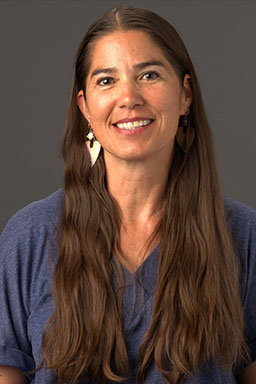Jenney Hall
Latest News

Professor Fights Environmental Racism With Urban Farm and Thrift Store
*By Larry R. Hygh, Jr., Ed.D.
“Our students are disproportionately affected by air pollution, water pollution, and lead pollution,” says Jenney Hall, Assistant Professor in the Interdisciplinary Studies Department at California State University Dominguez Hills (CSUDH). Hall has been at CSUDH for nine years and is now in a tenure track position where her focus is on environmental racism.
Hired in 2016, Hall used a grant from the chancellor’s office to start what is now an urban farm on campus. There was a geranium farm, and a tool shed, on the plot of land where the farm is now located. “I had nothing to start with,” she says. “I started from scratch clearing everything out because it was overrun.” Now, there are two full-time staff members who are farm managers and lots of student volunteers. The farm project has expanded beyond its initial scope and is now planning for a second phase involving the construction of a new facility on campus.
Hall believes in focusing on program building and high impact practices to reach different populations. “There are parts of the city that have environmental education from pre-kindergarten through 12th grade,” she says. “The students who are least affected (by environmental racism) have the most education about it. She hopes to change that narrative with measurable tasks such as having more green space, growing more food, and having more tree canopy covers. “We must build programs that encourage students to take action both on campus, and in their communities.”
A new venture Hall is tackling is a pop-up thrift store on the first Tuesday of every month that takes place at the farmer’s market between the library and Loker Student Union. She speaks about a culture in which everything is disposable and replaced as much as possible. “All of that energy that goes into this contributes to the pollution,” Hall says. “A huge impact is all of the stuff we buy, especially how we clothe ourselves…If we are a local economy, we give it back to each other and it keeps the money inside our local economy. There is a community benefit, the local economy.”
The thrift shop is an extension of Hall’s course “UMB 101 – The High Cost of Cheap Fashion.” The class goes through donated items and does quality control and sorting. Donations are accepted in bins across from the IT office in the Natural Sciences and Mathematics (NSM) building. At the pop-up thrift store students can receive items for free for themselves and their families. “The ultimate goal is to have a regular thrift shop on campus with student workers,” she says.
Hall is the mother of twin boys. “I’m a parent, and I’m hopeful for my kids. You want to make the world a better place for your kids.” She cites those twin boys as the greatest influence in her life. “If I feel discouraged, or disparaged about the world, it’s this call to show up for them.” She added, “I am pathologically optimistic. At the end of the day, we live on a beautiful planet and have an amazing world.”
Hall earned a Doctor of Philosophy (Ph.D.) degree from Louisiana State University (LSU) in Geology and Geophysics, a Master of Science (M.S.) from the University of Kansas in Geology, and a Bachelor of Science (B.S.) from Southern Utah University in Geology and Chemistry. She was also a Donnelley Postdoctoral Research Fellow at Yale University.
Hall has been an adjunct professor at Santa Monica College, El Camino College, and an online education assistant at the University of Santa Monica.
What’s the best part of being at CSUDH?
“It’s the students. The students are awesome. There is such a diversity of perspective here. Every class I learn something from my students. The challenge, and the beauty of it is, how do I meet them where they are? How do we learn from each other? At the end of the day, we have to be able to work together to affect change. Our diversity is our superpower at DH.”
What advice do you have for students?
“It’s healthy for you to be outside. It’s good for you to put your hands in the dirt. Be in your natural environment and have fun. Embrace the green spaces. Embrace hard work throughout your life.”
What do you like doing outside of being a professor/hobbies
“I really like to be on the ocean, kayaking in the marina, paddleboarding, sitting on the beach, getting out in a boat and going sailing.”
What is your favorite quote?
“Action is the antidote to despair.” (Joan Baez)
Instagram
@jenneyhall
*Hygh is an Assistant Professor in the Communications Department teaching in the Advertising and Public Relations degree program. Prior to academia he spent 20 plus years as chief communications officer in The United Methodist Church. Visit him on the web at www.LarryHygh.com.